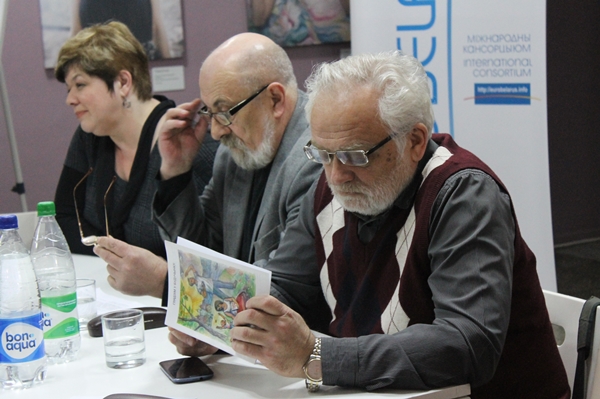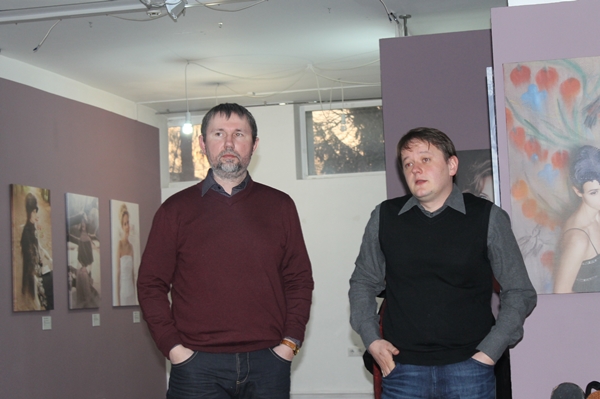The Belarusan National Platform of the EaP CSF issued a statement in connection with the wave of searches in the editorial offices of the Belarusan media and the detention of journalists.
Does bilingualism pose a threat to the Belarusan language or is it an exaggerated problem? (Photos & Video)

The Flying University and the International Consortium “EuroBelarus” organized a public discussion “Bilingualism as a cultural strategy. Is it a way to prosperity of to decay?”
Obviously, language is one of the burning and daunting problems for Belarusans, which became even more daunting during the Ukrainian events, where the allegeable protection of the Russian language became one of the arguments for Russia’s aggression.
It was Ihar Babkou’s theses which served as a ground for discussion. In these theses, the philosopher and literary man position the strategy of bilingualism for the development of the Belarusan culture. The following questions were suggested for the participants of the discussion:
- Is bilingual cultural strategy able to resolve language contradictions and conflicts under the “new circumstances”?
- Should we change the national context in language issue to the broader one?
- Is there possibility to develop bilingual strategy? Do we have its supporters and opponents?
- What questions arouse under the change of strategy from “Belarusan in form” to “Belarusan in content”?
For now we can’t say that the participants of the discussion found a consolidated answer to the suggested questions. But the discussion did become heated.
According to Ihar Babkou, “we cannot be divided into Belarusan-speaking and Russian-speaking; we are bilinguals with the different functional language division”:
“The majority of Belarusans are monolinguals; everyone knows that. However, I believe that Belarusan bilingualism and biculturalism have their starting moment, which go back to 60-70s of the 20th century in a situation of sudden urbanization of late-Soviet civilization. It was then that the specific multiculturalism, which can be called colonial, started to mold in cities. Belarusan culture was given a role of ethnographically-local flavor, while Russian culture was universal. The 90s can be called a war of cultures, and I believe that the remains of this war are still present in our national consciousness, and even in our personal consciousness.”
Uladzimir Matskevich, the philosopher and methodologist, believes that “the language problem is strategically dangerous”:
“Though it is hard to explain to people who perceive it at an everyday’s level, but if we consider the language issue from the historical or political aspect, we would have noticed this danger long ago, as it is obvious today – we see it in the situation with Ukraine and its south-eastern regions. If back in 1990s Russian had launched a huge program aimed at creation of the so-called Russian world, most reflexive already would have seen a delayed-action bomb, able to go off one day, in it. There are two problems that Belarusans face here. Should we join or distance ourselves from the Russian world? If we are Belarusans, then we are to distance ourselves from this project, even if we preserve Russian language as our native language. There are plenty of bilingual nations in the world, so we shouldn’t be very concerned about that. The other problem is the vulnerability of our mentality in the cyberspace. Mother tongue serves as a protection from the foreign and often hostile intellectual and mental influence, and for today we don’t have that.”
We shouldn’t contrast Russian language with Belarusan language in today’s situation, Matskevich notes.
Russian language is our state language, too, but we should make it our Russian language with no Russian rule over it. And it is in this direction that, I believe, we are to discuss the existing problems.
A philosopher Valiantsin Akudovich says that “Russian language hasn’t yet managed to defeat Belarusan language”. “However, at the same time Belarusan language didn’t manage to oppose Russian language so that it retreats to its historical homeland, Russia”:
“We are now in the situation when Belarusan-speakers are getting used to Russian-speakers, when suspicion and uneasiness still remain. But at the same time, I’m sure that we will get used to it and this hostility and suspicion will disappear in 5-10 years, even though under current Ukrainian developments it has become more difficult to do that. It is important that we forget or stop being fixed at the idea that Belarusan nation can base only on Belarusan language. It can — and it will — be different. This idea is not working today; for more than 20 years Belarusan nation is being formed in a different way. As a nation, we are developing due to the state and to all its institutes, and the role of language is very weak. But at the same time, language is more than our national value. Everything that is valued, starting from Skaryna’s bible to the Statutes of Lithuania, was written in Belarusan language. Thus, Russian language is a function, and Belarusan is more of a value today.”
A culture expert Yulia Chernyauskaya is convinced that “Belarusan language won’t disappear”:
“Moreover, it will be flourishing. I see it from the process, as the youth doesn’t perceive Belarusan language as the language of villagers anymore; Belarusan language has become prestigious and fashionable, even though people don’t speak it. This is the paradox: it is valued, loved and respected, but we are not obliged to speak it.”
The audience is certainly waiting for the continuation of the discussion.
Video:
Others
-
Statement of the Belarusan EaP CSF National Platform on solidarity with the civil society of Armenia
The Belarusan National Platform of the Eastern Partnership Civil Society Forum issued a statement on solidarity with the civil society of Armenia.
-
Statement of the BNP in connection with the criminal prosecution of the leaders of the Belarusan independent trade unions
The Belarusan National Platform of the Eastern Partnership Civil Society Forum issued a statement in connection with the criminal prosecution of the leaders of the Belarusan independent trade unions.
-
Final event of project CHOICE — Paving the way to European Year of Cultural Heritage 2018
The final event of the two-year EU funded project CHOICE — Cultural Heritage: Opportunity for Improving Civic Engagement was held on June 6, 2017 at the Committee of the Regions, in Brussels.
-
Heritage is a verb. The results of the CHOICE project were summarized in Minsk (Photos and video)
Does Belarus need a “Public Ministry of Culture” and “Ašmiany Charter” to deal with the historical and cultural sites?













Comments
From farewell to a new Eastern policy and towards a new development
Poland and Germany were both initiators and drivers of a New Eastern policy linked to the Eastern neighborhood and Russia/Soviet Union.